Filter by
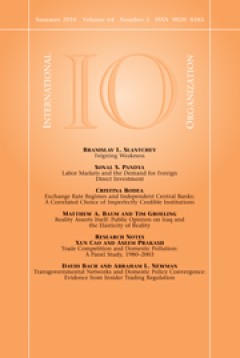
Trade Competition and Domestic Pollution : A Panel Study, 1980–2003
This research note examines whether trade competition abets regulatory races in the environmental area. To analyze trade competition, we develop a new measure, structural equivalence, which assesses competitive threats that a country faces from other countries whose firms export the same products to the same destination countries. Employing this new measure, we analyze air pollution intensity (…
- Edition
- Vol. 64, No. 3, July 2010.pp. 481-503
- ISBN/ISSN
- 00208183
- Collation
- -
- Series Title
- International Organization
- Call Number
- -

Transgovernmental Networks and Domestic Policy Convergence : Evidence from In…
Cross-border cooperation among domestic regulators and public officials has become a defining feature of global governance. While a number of studies have tracked the emergence and institutionalization of such transgovernmental networks, less is known about their effect on domestic policy. This study explores this link for the important case of insider-trading regulation in original data for 11…
- Edition
- Vol. 64, No. 4< July 2010.pp. 505-528
- ISBN/ISSN
- 00208183
- Collation
- -
- Series Title
- International Organization
- Call Number
- -

Social and environmental inequalities and injustice in the rural uplands of E…
Inequalities may lead to injustice, and are recognized increasingly as contributing to a wide range of social problems. The English uplands are characterized by low population densities, few services and low household incomes compared with other rural areas, giving rise to the potential for injustice. We use a dataset combining social, economic and environmental variables to develop a new integ…
- Edition
- Vol. 31 no. 2, May 2011.pp. 266-284
- ISBN/ISSN
- 02610183
- Collation
- -
- Series Title
- Critical Social Policy
- Call Number
- -
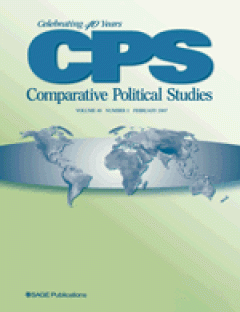
Deadly Communities : Local Political Milieus and the Persecution of Jews in O…
Why, after the outbreak of World War II in Eastern Europe, did the inhabitants of some communities erupt in violence against their Jewish neighbors? The authors hypothesize that the greater the degree of preexisting intercommunal polarization between Jews and the titular majority group, the more likely a pogrom. They test this proposition using an original data set of matched census and elector…
- Edition
- Vol. 44 no. 3, March 2011.pp. 259-283
- ISBN/ISSN
- 00104140
- Collation
- -
- Series Title
- Comparative Political Studies
- Call Number
- -

Who Says “It’s the Economy”? Cross-National and Cross-Individual Variat…
Theories of government approval usually assume that voters care about economic outcomes. This assumption frequently does not hold. Data from the Comparative Study of Electoral Systems demonstrate that although the economy is often the most important issue in an election, its place on the issue agenda varies across individuals and electoral contexts. The economy is more likely to dominate other …
- Edition
- Vol. 44 no. 3. March 2011 .pp. 284-312
- ISBN/ISSN
- 00104140
- Collation
- -
- Series Title
- Comparative Political Studies
- Call Number
- -
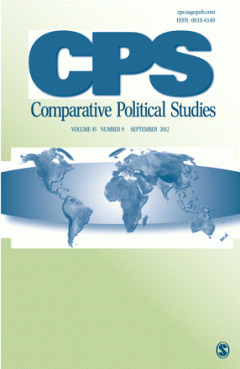
Voting for Our Story : A Narrative Model of Electoral Choice in Multiparty Sy…
- Edition
- Vol. 44 no. 3, March 2011.pp. 313-338
- ISBN/ISSN
- 00104140
- Collation
- -
- Series Title
- Comparative Political Studies
- Call Number
- -
- Edition
- Vol. 44 no. 3, March 2011.pp. 313-338
- ISBN/ISSN
- 00104140
- Collation
- -
- Series Title
- Comparative Political Studies
- Call Number
- -

Clarity of Responsibility Beyond the Pocketbook : How Political Institutions …
One of the most influential findings of the voting behavior literature of the past two decades was the realization that the clarity of the domestic institutional context influences the relationship between economic perceptions and incumbent vote. This article extends this �clarity of responsibility� argument beyond economics to another policy field�European integration. To what extent do nation…
- Edition
- Vol. 44 no. 3, March 2011.pp. 339-363
- ISBN/ISSN
- 00104140
- Collation
- -
- Series Title
- Comparative Political Studies
- Call Number
- -
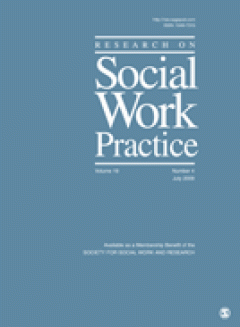
A Meta-Analysis of Interventions to Reduce Adolescent Cannabis Use
Objective: This meta-analytic review assesses the effectiveness of substance abuse interventions to reduce adolescent cannabis use. Method: A systematic search identified 15 randomized controlled evaluations of interventions to reduce adolescent cannabis use published between 1960 and 2008. The primary outcome variables, frequency of cannabis use, and quantity of cannabis use, were measured bet…
- Edition
- Vol. 21 no. 2, March 2011.pp. 153-164
- ISBN/ISSN
- 10497315
- Collation
- -
- Series Title
- Research on Social Work Practice
- Call Number
- -

A Controlled Trial of the Making Choices Program : Six-Month Follow-Up
Objective: Six-month follow-up outcomes from a controlled trial of a program designed to prevent aggressive behavior in childhood are described. Method: Data were collected from three sequential cohorts of third graders in two public elementary schools (N =443). The Year 1 cohort received a routine health curriculum. The Year 2 cohort received the Making Choices program. The Year 3 cohort recei…
- Edition
- Vol. 21 no. 2, March 2011.pp. 165-176
- ISBN/ISSN
- 10497315
- Collation
- -
- Series Title
- Research on Social Work Practice
- Call Number
- -

Outcomes of Group Care for Youth : A Review of Comparative Studies
Objective: The purpose of this study was to review empirical evidence of the effects of placement in group care compared to other interventions. Method: Two-group empirical studies were identified and effect sizes for all reported outcomes were calculated. Results: Nineteen two-group studies were found that compared group care with family foster care, treatment foster care, no placement, and di…
- Edition
- Vol. 21 no. 2, March 2011.pp. 177-189
- ISBN/ISSN
- 10497315
- Collation
- -
- Series Title
- Research on Social Work Practice
- Call Number
- -

Providing Competency Training to Clinical Supervisors Through an Interactiona…
Training in supervisory competencies is essential to effective clinical practice and helps address the current national crisis in the behavioral health workforce. Interactional supervision, the approach used in the current study, is well established in clinical social work and focuses the task of the supervisee on the interpersonal exchanges encountered in clinical practice. This study examines…
- Edition
- Vol. 21 no. 2, March 2011.pp. 190-199
- ISBN/ISSN
- 10497315
- Collation
- -
- Series Title
- Research on Social Work Practice
- Call Number
- -

Validation of the Evidence-Based Practice Process Assessment Scale-Short Version
Objective: This report describes the reliability and validity of the Evidence-Based Practice Process Assessment Scale (EBPPAS)� Short Version, validated with three disciplines (Social Work, Licensed Marriage and Family Therapists (LMFTs), and Psychologists), that assesses practitioners� perceived familiarity with, attitudes about, and implementation of the evidence-based practice (EBP) process.…
- Edition
- Vol. 21 no. 2, March 2011 .pp. 200-211
- ISBN/ISSN
- 10497315
- Collation
- -
- Series Title
- Research on Social Work Practice
- Call Number
- -

Validation of the Cultural Influence on Helping Scale Among Chinese Adolescents
The influence of culture on adolescent prosocial behavior is a neglected aspect in existing studies. Objectives: This study evaluates the psychometric properties of the Cultural Influence on Helping Scale (CIHS) among Chinese adolescents. CIHS is an instrument that assesses Chinese cultural influence on helping other people. Method: The CIHS was administered to 5,812 high school students in Hon…
- Edition
- Vol. 21 no. 2, March 2011.pp. 212-221
- ISBN/ISSN
- 10497315
- Collation
- -
- Series Title
- Research on Social Work Practice
- Call Number
- -

Evaluating Journal Quality : Is the H-Index a Better Measure Than Impact Fact…
Objectives: This study evaluates the utility of a new measure�the h-index�that may provide a more valid approach to evaluating journal quality in the social work profession. Method: H-index values are compared with Thomson ISI 5-year impact factors and expert opinion. Results: As hypothesized, the h-index correlates highly with ISI 5-year impact factors; but exhibits closer agreement with exper…
- Edition
- Vol. 21 no. 2, March 2011 .pp. 222-230
- ISBN/ISSN
- 10497315
- Collation
- -
- Series Title
- Research on Social Work Practice
- Call Number
- -
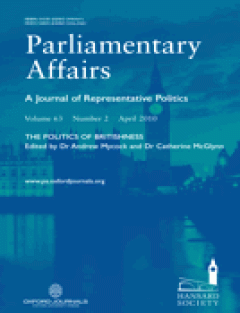
Simulating the Effects of the Alternative Vote in the 2010 UK General Election
The Conservative/Liberal Democrat Coalition government has announced its intention to hold a referendum on the possible introduction of the Alternative Vote (AV) for future elections to the House of Commons. This paper uses survey data from the 2010 British Election Study to simulate what the effects on the seat distribution in the House of Commons would have been if AV had operated in May 2010…
- Edition
- Volume 64, Issue 1, January 2011. Pp. 5-23
- ISBN/ISSN
- 00312290
- Collation
- -
- Series Title
- Parliamentary Affairs
- Call Number
- -

Britain's First Live Televised Party Leaders’ Debate : From the News Cycle …
Britain's first ever live, televised, party leaders� debate took place on 15 April 2010, during one of the most intriguing and closely fought general election campaigns in living memory. Arguably the most important single development in the media's treatment of politics since the arrival of television during the 1959 campaign, the leaders� debate and its aftermath provide a unique window on the…
- Edition
- Volume 64, Issue1, January 2011. Pp. 24-44
- ISBN/ISSN
- 00312290
- Collation
- -
- Series Title
- Parliamentary Affairs
- Call Number
- -

French Electoral Reform and the Abstention Rate
In France, more than other mature democracies, the election rules undergo reform. Our concern is how these reforms influence mass electoral behaviour, namely voter turnout. We gather an extended national data set on the abstention rate, across the republics of France, and subject it to an interrupted time-series analysis. Two sets of hypotheses are explored: structural and tactical. The structu…
- Edition
- Volume 64, Issue1, January 2011. Pp. 45-60
- ISBN/ISSN
- 00312290
- Collation
- -
- Series Title
- Parliamentary Affairs
- Call Number
- -

Political Conduct and Misconduct : Probing Public Opinion
The media and public responses to the expenses scandal of 2009 demonstrated the enduring importance of standards of conduct in British public life. This article addresses some basic questions concerning citizens' attitudes towards political wrongdoing, including how much notice people actually take of politicians' misbehaviour, how much importance citizens attach to politicians' integrity and h…
- Edition
- Volume 64, Issue 1, January 2011. Pp. 61-81
- ISBN/ISSN
- 00312290
- Collation
- -
- Series Title
- Parliamentary Affairs
- Call Number
- -

The Australian Parliament : A Gendered Organisation
This study, drawing on interviews with 13 male and 15 female members of the Australian parliament, has two aims. The first is to contribute to knowledge about the nature of the Australian parliament, an institution which has seldom been subjected to gender analysis. This is particularly pertinent given the significant increase in women's representative status over the past decade. The second of…
- Edition
- Volume 64, Issue 1. January 2011. Pp. 82-105
- ISBN/ISSN
- 00312290
- Collation
- -
- Series Title
- Parliamentary Affairs
- Call Number
- -

The Quality of Discussion on the Economy in UK Political Blogs in 2008
In the early years of the twenty-first century, things look bleak for the political journalists of large newspapers�squeezed by the demands of celebrity culture, bullied by politicians and their aides, untrusted by the public and, now, displaced by a horde of amateur bloggers�or do they? This study is based upon an in-depth, comparative analysis of the quality of debate, on economic issues, in …
- Edition
- Volume 64, Issue 1, January 2011. Pp. 106-128
- ISBN/ISSN
- 00312290
- Collation
- -
- Series Title
- Parliamentary Affairs
- Call Number
- -
 Computer Science, Information & General Works
Computer Science, Information & General Works  Philosophy & Psychology
Philosophy & Psychology  Religion
Religion  Social Sciences
Social Sciences  Language
Language  Pure Science
Pure Science  Applied Sciences
Applied Sciences  Art & Recreation
Art & Recreation  Literature
Literature  History & Geography
History & Geography